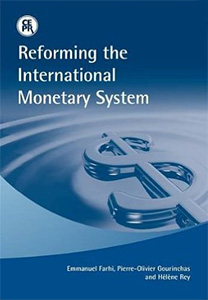 Emmanuel Farhi, Pierre-Olivier Gourinchas and Helene Rey
Emmanuel Farhi, Pierre-Olivier Gourinchas and Helene Rey
This report presents a set of concrete proposals of increasing ambition for the reform of the international monetary system. The proposals aim at improving the international provision of liquidity in order to limit the effects of individual and systemic crises and decrease their frequency. The recommendations outlined in this report include:
- Develop alternatives to US Treasuries as the dominant reserve asset, including the issuance of mutually guaranteed European bonds and (in the more distant future) the development of a yuan bond market.
- Make permanent the temporary swap agreements that were put in place between central banks during the crisis. Establish a starshaped structure of swap lines centred on the IMF.
- Strengthen and expand existing IMF liquidity facilities. On the funding side, expand the IMF’s existing financing mechanisms and allow the IMF to borrow directly on the markets.
- Establish a foreign exchange reserve pooling mechanism with the IMF, providing participating countries with access to additional liquidity and, incidentally, allowing reserves to be recycled into productive investments.
To limit moral hazard, the report proposes the setting up of specific surveillance indicators to monitor “international funding risks” associated with increased insurance provision. The report discusses the role of the special drawing rights (SDRs) and the prospects for turning this unit of account into a true international currency, arguing that it would not solve the fundamental problems of the international monetary system. The report also reviews the conditions under which emerging market economies may use temporary capital controls to counteract excessive and volatile capital flows. The potential for negative externalities requires mutual monitoring and international cooperation in terms of financial regulation and suggests that the mandate of the IMF should be extended to the financial account.

